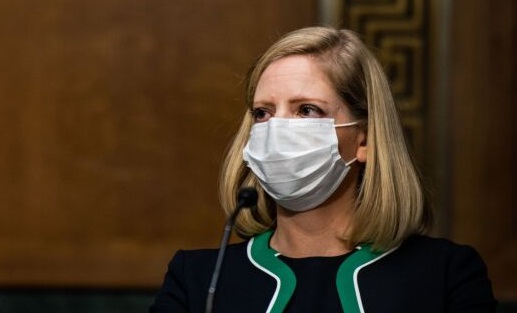In recent discussions within Congress, Dana Wade, a former research fellow at the Koch Institute, has emerged as a potential candidate for the position of Deputy Secretary of the Department of Housing and Urban Development (HUD). Wade’s professional history includes serving as the Assistant Secretary of Housing and Urban Development and a role in the Office of Management and Budget, as well as acting as deputy staff director of the Senate Committee on Banking, Housing, and Urban Affairs. Her candidacy, however, raises eyebrows, particularly in light of her recent affiliation with Walker & Dunlop, a real estate financing company known for its substantial financial backing of Democratic campaigns. This connection complicates her standing among conservative factions, especially in light of her open criticism of former President Trump’s financial reform approach.
Wade’s transition to Walker & Dunlop in 2021 marked a significant shift in her career, aligning her more closely with Democratic interests. The company has been notably prolific in political spending, contributing hundreds of thousands of dollars during the last election cycle to various Democratic entities, including the Democratic Senatorial Campaign Committee and the Democratic Congressional Campaign Committee. Even more controversially, Walker & Dunlop also siphoned funds to support Ron DeSantis, Trump’s primary opponent, amplifying concerns about Wade’s loyalty to Trump’s administration. Her critique on Investors.com regarding Trump’s financial reforms suggests a divergence from traditional conservative values, raising questions over her fit for a role in a Republican administration, especially one led by Trump.
The push for Wade’s nomination occurs against a backdrop of increased tensions within the Republican Party, particularly with the recent ousting of Matt Gaetz and the efforts to sideline figures like Pete Hegseth and Kash Patel. This growing rift underscores a broader concern among conservatives about the infiltration of RINOs (Republicans In Name Only) and Democrats into the Trump administration. There is a palpable fear that figures who do not align with the core principles of the GOP are positioning themselves for key roles within HUD and other departments, threatening the integrity of the party’s agenda. Wade’s potential role within this context raises further alarms about the direction the administration might take if such figures gain influence.
In parallel with Wade’s consideration, Dallas Mayor Eric Johnson has also been floated as a candidate for a HUD position in Trump’s cabinet, demonstrating a trend of attracting individuals with questionable loyalty to traditional Republican values. Johnson’s change from a Democratic to a Republican affiliation was controversial enough to draw attention from various political analysts. Notably, he had publicly opposed Trump during the 2020 election, making his candidacy indicative of the growing chasm in understanding within the GOP around party affiliation and ideological commitment. His past statements, particularly in support of immigrant communities, stand in stark contrast to the hardline stances typically championed by the GOP and Trump’s base, highlighting the struggle for authenticity in current GOP politics.
Johnson’s outspoken opposition to policies such as those related to sanctuary cities further aligns him with a faction of Republicans who have been viewed as complicit with Democratic ideals, eroding the strict ideological boundaries that were once characteristic of the party. His past remarks against anti-immigrant initiatives signal a divide within the GOP about how to address immigration, a centerpiece of Trump’s platform. This rift indicates a larger struggle for the future trajectory of the Republican Party, as some members lobby for a more inclusive approach while others cling to traditional conservative values.
Overall, the unfolding dynamics surrounding Wade’s candidacy for the Deputy Secretary position in HUD, combined with the potential nomination of figures like Johnson, illuminate significant fractures within the Republican Party. These instances reflect a critical juncture where the party must reconcile differing ideologies and strategies for governance. The implications of such nominations not only concern the integrity of the Trump administration itself but also the future identity of the Republican Party as it seeks to navigate the complexities of modern American politics.

